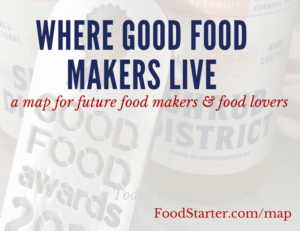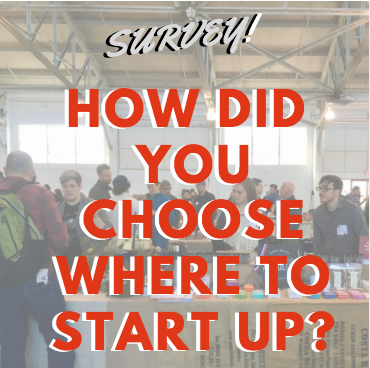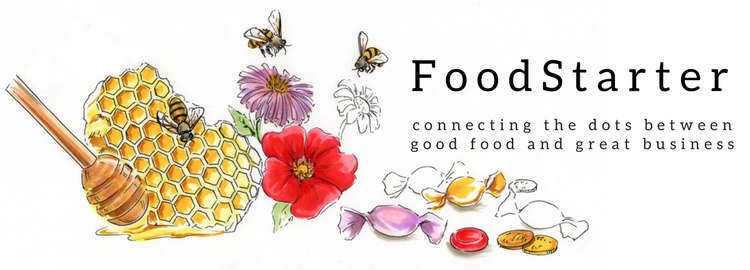WHERE TO LIVE is one of the biggest questions we ever face.
Finding a great place to live that’s also great for starting a business only complicates things.
I’m on a quest to find answers—specifically related to local food craft business.
TELL ME YOUR STORY
 In Good Food, Great Business you’ll find stories of entrepreneurs who chose where to live with their new food business being a big part of the decision-making process.
In Good Food, Great Business you’ll find stories of entrepreneurs who chose where to live with their new food business being a big part of the decision-making process.
These days entrepreneurs with virtual businesses can live anywhere. You could even potentially run a food business online by having a co-packer make and fulfill the food while you handle marketing and customer service remotely. (Thrillist profiles cities around the world for those who want to be seriously nomadic.)
Many Factors For Locating a Specialty Food Business
Do you want to start a cottage / home-based food business?
Your state needs to allow home-based food businesses…and in particular the kind of food you want to make.
But do you want to be near a food business incubator for possible support?
To be part of the Chobani’s food business incubator, New York is the place to be — although one of my clients worked out a scheme for how she would travel to New York if her “side hustle” food idea got accepted…meanwhile keeping her full-time job during the week.
Chobani also started a Food Technology incubator based on its own operations (brilliant!) at its locations in New York and Idaho.
Kraft Foods has developed a Chicago-based incubator, called Springboard Brands, for food startups in and near Chicago.
Are you tapping into local ingredients like 2018 Good Food Awards finalist Maui Jewels? As you might have guessed, their life in Maui ties into their use of the fruits of Hawaii.
Brooklyn-based pasta maker Sfoglini recently raised $2.5 million for expansion. They say: “Prior to the move upstate and fundraising, Sfoglini had $1MM in sales but is projected to grow to $10MM in the next few years. Sales are expected to more than double in the first year of production at Sfoglini’s new Coxsackie plant, which is 10 times the size of the pasta maker’s original shop.”
While Brooklyn would not be the cheapest place to make pasta, New York has a surprising number of nearby lower cost towns for production.
Oh, but there are even cheaper places for pasta makers using American grains. The Great Falls Montana Development Authority (GFDA) says that Great Falls is the “least expensive market to operate a food processing plant based on a review of 25 U.S. cities” that process foods using raw materials from the Great Falls area.
Basically the study encourages food companies to process closer to the ingredients’ origin.
They say that “Great Falls region is an emerging destination for food processing plants with a recent investment of $20 million by Montana Specialty Mills on a new processing center. Other food processing companies in the region include Pasta Montana which recently invested $6.5 million in a line expansion; Montana Eggs which recently opened a new $9 million facility; Montana Milling; General Mills; CHS Nutrition and others.
I have not delved into each of these processors, but a representative tells me these Montana-based companies all can process organically:
- Timeless Seeds – https://www.timelessfood.com
- Montana Milling – http://www.montanamilling.
com - Montana Speciality Mills – http://www.mtspecialtymills.
com/operations.php - Montana Flours and Grains – http://www.montanaflour.com
- Big Sandy Organics – Kracklin Kamut – https://www.kracklinkamut.
com
Do you want / need to be near a co-packer? Being able to manage production runs is especially important if the type of food you’re having manufactured is complex.
Oh, but do you need to be somewhere that you can afford to buy a house or a retail space?
Hmm, maybe New York’s major cities won’t work. Then again a town north of New York like Millerton, where Irving Farm Coffee Roasters is located, in the Hudson Valley could be just the ticket.
Christopher Hastings Confections chose Waterville, Maine over the super-happening Portland, Maine just for that reason. Christopher says: “The location has been exciting for us – we are now just moving into a new space, twice the size – and growing from a wholesale/pop-up model to a full-time retail store. This would not have been possible for us in Portland or southern Maine. As we are bootstrapping our business, price per square foot for rentals is key. We do worry about foot traffic, but this is a college town so we have high hopes!”
Plus there’s always the Internet and, for more shelf-stable foods, the opportunity to sell into retailers nationwide as well as abroad.
Wallet Hub’s “Best Large Cities to Start a Business”
Click through to see the list of 182 places (I’m proud / relieved that my town Oakland, CA came in 36th, although California’s long-time, minimum $800 annual fee to run an LLC, no matter how unprofitable, is totally anti-startup, IMHO).
The list is awesome…an unusual mix of locales that’s worth comparing to my map of Good Food Awards finalists.
Forbes makes a strong case for why Chicago is the place to start a food business.
I’m working on this project to help food entrepreneurs decide where and how to live on your own terms based on your own life goals and constraints.
Now help me by participating in this study…

Share your story about great (and not so great) places to live to start different types of food craft businesses.






